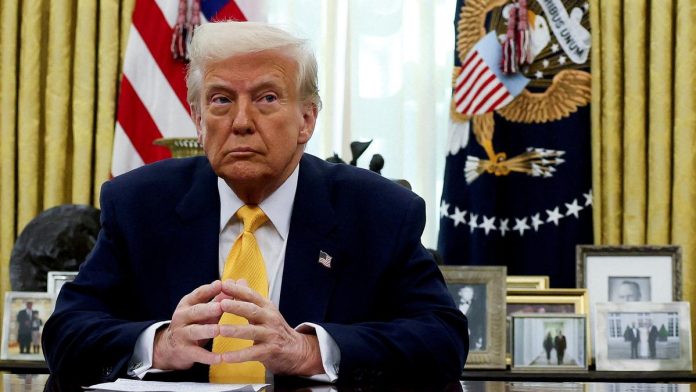In recent developments, former U.S. President Donald Trump announced a controversial new initiative aimed at encouraging illegal immigrants to leave the United States voluntarily. The “self-deportation program” offers airfare stipends and financial incentives to those willing to depart the country. While it has sparked debates on both sides, the initiative is part of Trump’s broader vision for U.S. immigration reform, which prioritizes national security while seeking to address labor shortages in key industries. But what does this program mean for immigrants, the U.S. economy, and the future of immigration policy?
In This Article:
The Core of Trump’s Airfare Stipend Program
The “Trump airfare stipend” program, as it is being called, is designed to encourage undocumented immigrants to leave the U.S. voluntarily by offering a stipend and a plane ticket. The initiative seeks to remove individuals who have criminal records, especially those who have committed serious crimes such as murder, from U.S. soil. President Trump emphasized that the program would not just focus on removal but also create pathways for those who have lived in the U.S. for extended periods and have contributed positively to society. If these individuals wish to return, they will be assisted in doing so legally.
The stipends will act as a financial incentive, ensuring that the immigrant’s return is facilitated without economic burden. This initiative, according to Trump, will reduce the overall cost of deportations, which are typically handled by the federal government. Moreover, it aims to foster cooperation between the U.S. government and immigrants who may want to return to their home countries while offering assistance in reintegrating into their homeland.
What Does This Mean for Immigrants?
For immigrants, the Trump airfare stipend program offers both opportunity and uncertainty. The financial incentive could be appealing for those struggling with their current legal status, offering them a chance to leave without facing the trauma of forced deportation. For immigrants who have lived in the U.S. for years and may have families, the stipends could serve as a lifeline to return home with minimal financial hardship.
However, the program also raises questions about fairness and the treatment of long-term undocumented residents. Immigrants who have lived in the U.S. for decades, contributing to various sectors of the economy, could find themselves in a position where they are pressured to leave without a clear path for legal re-entry. While Trump claims that the program could make it easier for some to return legally, the lack of specific details on how this will unfold leaves much to be desired.
Economic Impacts of the Airfare Stipend Program
One of the most contentious aspects of the Trump airfare stipend program is its potential economic implications. By encouraging illegal immigrants to leave voluntarily, the program could alleviate some of the economic pressures associated with managing undocumented populations. However, it could also create labor shortages in industries heavily reliant on immigrant workers, such as agriculture, hospitality, and construction.
Many U.S. farmers and businesses have already expressed concerns about the possibility of labor shortages. These industries have long depended on immigrant labor, particularly undocumented workers, to fill essential roles. The program’s impact on these sectors could be significant, as businesses may face challenges in recruiting workers quickly enough to maintain productivity levels.
On the other hand, Trump’s initiative also seems designed to create pathways for these workers to return to the U.S. legally, which could ease some concerns. By helping immigrants re-enter the workforce legally, the program could balance the needs of the economy with immigration policies.
Political Reactions and Criticism
The Trump airfare stipend initiative has generated significant political reactions. Critics argue that the program is yet another attempt to push an aggressive immigration agenda that penalizes vulnerable populations. They claim that the financial incentives might coerce immigrants into leaving without offering sufficient legal guarantees for their return.
Proponents of the initiative, however, believe it is a more humane approach to managing illegal immigration than the aggressive deportations seen in previous years. They argue that this strategy could encourage undocumented immigrants to leave the U.S. voluntarily while still allowing them the possibility of returning in a legal and controlled manner.
The Future of Immigration Policy
The Trump airfare stipend program could potentially reshape U.S. immigration policy in profound ways. While some view it as a more efficient and humane solution to illegal immigration, others fear it could lead to more hardship for immigrants, particularly those who have integrated into American society over the years. The program’s long-term success will largely depend on its implementation and how the legal pathways for returning immigrants are managed.
In the coming months, it will be essential to watch how the Biden administration and other political figures respond to this initiative, especially as debates over immigration reform continue to evolve.
The Trump airfare stipend program represents a bold shift in U.S. immigration policy, aiming to address the complex issue of illegal immigration with financial incentives and voluntary departure. While it offers a new approach, it also presents significant challenges and questions about its fairness and economic impact. Whether this initiative will achieve its goals or face significant opposition remains to be seen. One thing is clear: the future of U.S. immigration policy will continue to evolve, and programs like the Trump airfare stipend will be a central part of that conversation.
By – Jyothi




